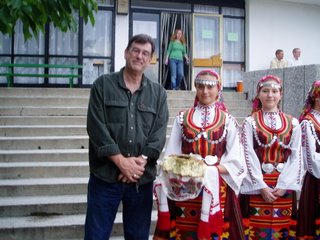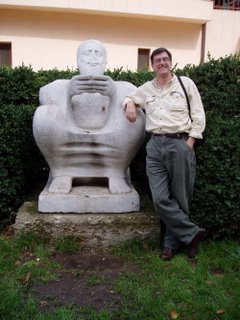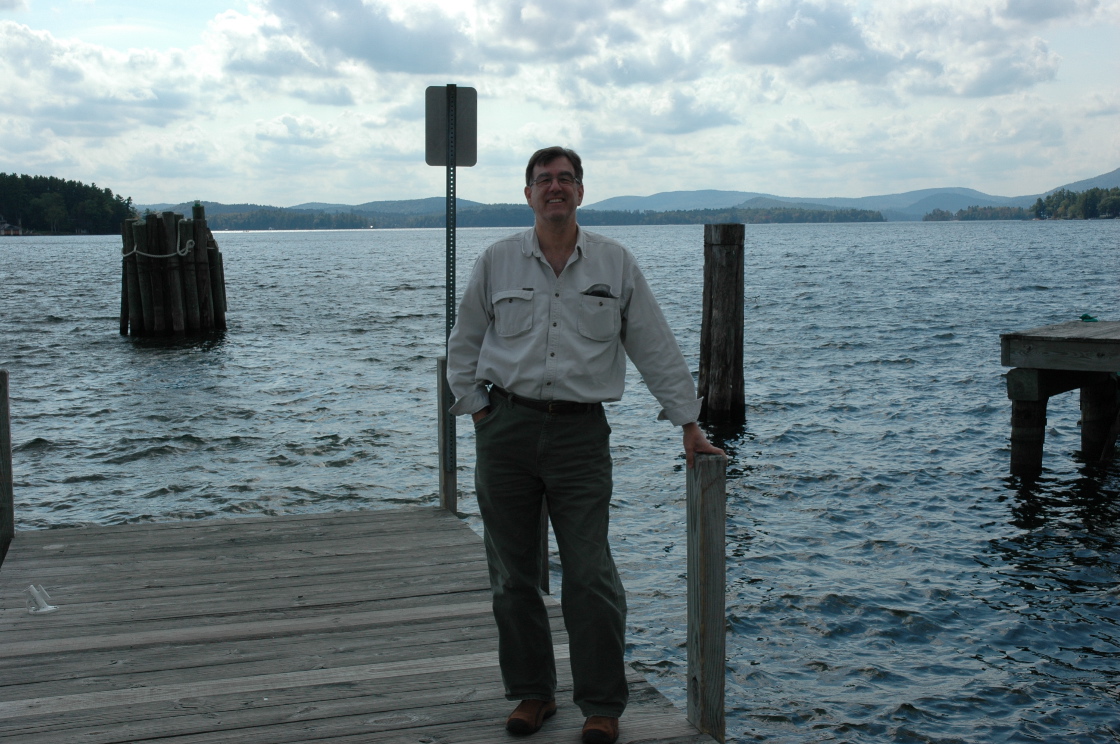
I have recently returned to the US after serving for two years in the Peace Corps in Bulgaria. It was dead smack in the middle of my time in Bulgaria, at our MidService Conference, that I happened to sit across from a friend at dinner who announced that she was leaving Bulgaria and the Peace Corps to take a job in the Foreign Service. I spent the rest of the evening asking her a million questions about her new job and how she had managed to land it. Because she had nothing better to do that night and because I had her trapped against a wall and the only way for her to get away would have been to crawl under the table, she graciously filled me in on the process. She also steered me towards the State Department website so I could learn a bit about the Foreign Service. Even after I realized that I wouldn't be serving at Fort Zinderneuf with Gary Cooper or wearing one of those cool white hats with the flap down the back, I was still interested. Foreign Service, Foreign Legion, I think it's a natural mistake.
The US Foreign Service is the branch of the State Department which provides the services offered by our embassies, consulates and diplomatic missions around the world. I read through the information on their website and decided that it would be as much fun as the Peace Corps, plus I'd get paid! So I began to look into signing up for the Foreign Service. My biggest concern was that I would be allowed to finish my Peace Corps service first. And, just like when I sent in my Peace Corps application, I didn't have a clue.

The process for joining the Peace Corps can stretch out for months, the process for joining the Foreign Service can run into years. If you visit their website (www.careers.state.gov/officer/index.html) you'll find some interactive programs to help you decide whether or not the FS is right for you and, if so, which career track might be most appropriate for you. They make it look so simple that you're tempted to look for a way to email them, "I'll take a career in Public Diplomacy. When may I expect my first paycheck?"
There are five career paths or tracks in the Foreign Service: Consular, Public Diplomacy, Political, Economic and Management. Anyone attempting to begin a career in the FS must select his or her track before beginning the application process. That's really all there is to it. Oh, and the FSWE (Foreign Service Written Exam). Uh, and the FSOA (Foreign Service Oral Assessment). Of course, there are also the clearance processes and the time on the register for your chosen track followed by beginning life all over again as a Junior Foreign Service Officer in a seven week training course in Washington DC. Yep, that's all there is to it.
So with encouragement from Lori and armed with all the info from the State Department website, I dove in, picked the Management track and registered for the Written Exam. The test was given worldwide on April 8, 2006 and I took it at the US Embassy in Sofia, Bulgaria. The FSWE is a five part exam and prior to beginning it you have to declare which of the five FS career tracks you want to specialize in. It is stressed that this will be your last opportunity to change your selection. Part One of the exam is the job knowledge section consisting of multiple choice questions which test your knowledge in a wide range of subjects such as economics, history, geography, math, cultural events, political science, US legal system, management theory, etc. Upon finishing this section, you proceed immediately to a second multiple choice section specifically designed for your track. Then there is a 50 minute hand-written essay followed by an English multiple choice test and, finally, another multiple choice section that assesses your general life skills. A minimum score on the multiple choice tests is set by the SD and only exams scoring above that number have their essays graded. In order to move on to the next phase of the selection process, you must then score above the cutoff mark on your essay.
I had received a letter from the FS directing me to report no later than 8:00am to the Embassy and when I arrived at about 7:30am I found a small group of PCVs milling around in front of the entry/security point. They explained that we wouldn't be allowed in until precisely 8:00am. It was cold out and, even though it wasn't raining, it was damp. A nice gesture would have been for the Ambassador to send out coffee and doughnuts to us, but because it was Saturday he was probably at home warm in his bed. Hey, he could have left someone a note. "A bunch of cold Peace Corps Volunteers will be milling aimlessly around in front of the entry/security point. Send out some coffee and doughnuts to them, will you? Oh, and I have a feeling that at least one of them prefers Boston Creams." See, that's what successful diplomacy is all about.
Promptly at 8:00am they began to process us through security five at a time. Large men in black uniforms guided us through bulletproof rooms, metal detectors and heavy fortress-like doors. We were told to surrender our cell phones and any other electronic devices. Our names were checked and double-checked against a list and we were, finally, escorted into the Embassy itself. It took about half an hour for us to clear security, and they were expecting us. I don't think you'd stand much of a chance if you just wanted to drop by and see the place. Your tax dollars at work in a highly secure environment.
The room to be used for the exam was all set up and ready for us. Each of us was assigned a table and each table faced a set of windows with a magnificent view of Mt. Vitosha. Vitosha was still covered with snow and, with a bright blue sky behind it, was a very pleasant distraction. The two proctors said, "no talking", read the rules, distributed the first test booklets and we were off to the races.
Six hours later we were finished. Well, it wasn't a straight six hours, there was a fifteen minute break. On the front of each test booklet, there was a Non-Disclosure Agreement that had to be signed. This basically stated that if I reveal any of the questions I will be prosecuted, denied employment in the FS, called several naughty names and made to wait outside without doughnuts or coffee for some indeterminate amount of time. I can, however, tell you that I spent several months brushing up on various topics such as history, economics, management theory, geography, the US political system, the US legal system and the US Constitution complete with all 27 amendments. I bought a study guide that gave me a course of action and I took it. I don't think that anything I did could ever be confused with actually studying, but I did spend time reviewing these areas in a helter-skelter fashion. I can say with complete confidence that out of a total of 400 odd questions (some were very odd) I felt really good about my answers on four or five. By 'really good' I, of course, mean that there was a 50-50 chance that I'd guessed correctly on them. The other 395 questions were a crapshoot. I was assured that handwriting didn't add to or detract from the score on the hand-written essay. My handwriting started out at illegible and ended up being a series of squiggly lines that represented some truly insightful words and sentences.
The test results would not be available until the end of July so, although I thought I'd done fairly well, whether that was well enough to move on to the next step or not wouldn't be known until then. All in all it was a very interesting experience and I rode the bus home to Stara Zagora feeling very confident that I was the only one on board who could pick the 17th Amendment to the US Constitution out of a lineup. As the weeks passed, however, I became less and less confident about my chances and at the same time I became busier and busier with Peace Corps so I more or less forgot about the test and my results.
In July, my group (the B-16's) began to prepare to end our service and leave Bulgaria. We had arrived en masse in August 2004 and those of us who were left had many options for going home. Basically, we could select any date within a thirty day window of October 10th to choose to end our service. I was sitting at my desk in Stara Zagora hemming and hawing and trying to decide which particular day to pick for my departure when I received an email from the State Department. I'd stopped thinking about the test a month or so before and this email took me by surprise. By this time, I was fairly certain that I hadn't done well enough to pass and I opened the message just to see how they gave people the bad news. I imagined that there would be a message along the lines of, "For someone who didn't pass, you did really well. Lot's of people don't get past this step and you can try again next year."
However, the first word I saw on the page was, "Congratulations!". I immediately went out and bought a box of chocolates to pass around the office. This is a Bulgarian tradition for anyone having anything at all to celebrate. If you get a new car, get engaged, have a birthday or nameday, win the lotto or pass an exam you "cherpiya" or treat. This then requires everyone to ask what the occasion is as you hand out your chocolates and you then have the opportunity to modestly announce your good news. It's a great tradition!

After passing the Written Exam, I next had to undergo an Oral Assessment. My 'Congratulations' letter gave me instructions to go online and make an appointment for this step in the process. Unlike the Written Exam which is given worldwide, the Oral Assessment is only conducted in specific US cities on specific dates. Sign-ups for these appointments were on a first come-first served basis and once made, were carved in stone.
I selected October 16th in Chicago and received an immediate confirmation. Okay, now all I had to do was complete my service in Peace Corps, pack everything up, move back to the States and begin to prepare for the Oral Assessment. So far, so good.
